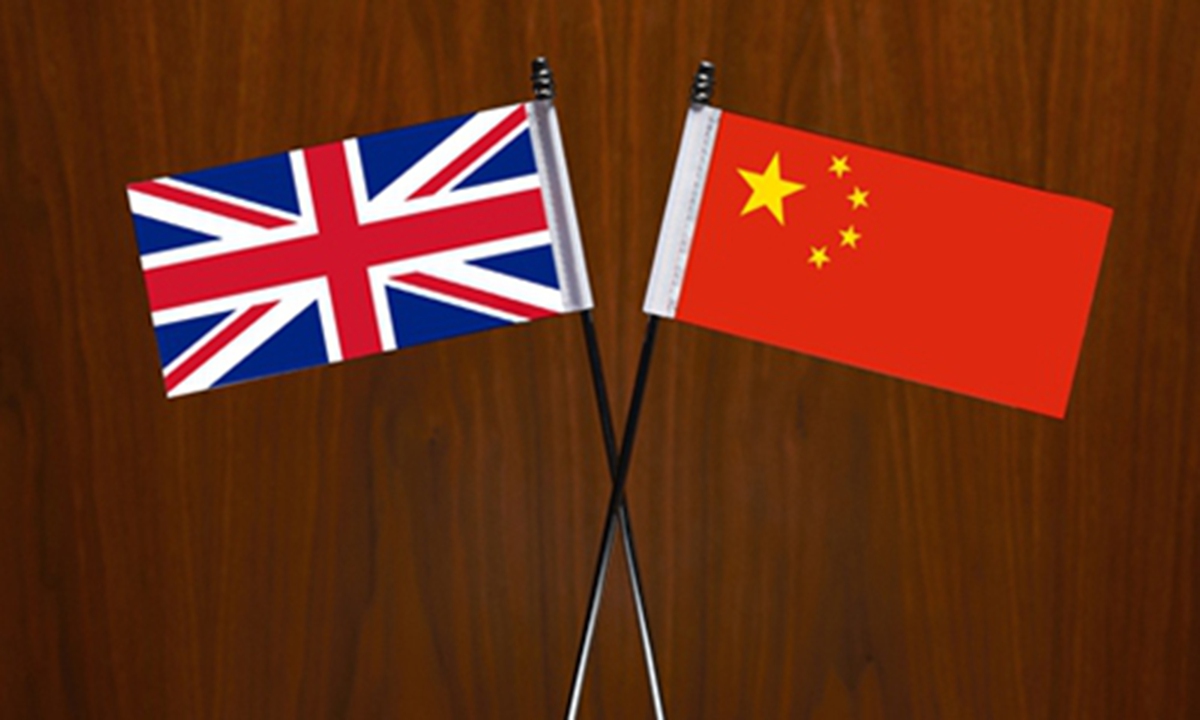Are Beijing, London on a collision course?
By Wang Cong and Zhang Han Source:Global Times Published: 2020/6/8 23:43:40 Last Updated: 2020/6/9 0:35:18
Room for balance between US, China is shrinking; London unlikely to completely follow Washington

China UK flag Photo: GT
As the China-UK bilateral relationship once hailed as entering a "golden era" faces renewed tensions over London's positions on issues related to China's internal affairs in Hong Kong and Chinese telecom firm Huawei, Beijing will likely seek to compartmentalize rising tensions with London by striking back in areas where the UK steps out of line while committing to maximize bilateral cooperation, Chinese analysts said on Monday.
Although UK officials have apparently been cautious in not getting into the escalating China-US tension, unlike some other Western countries such as Australia, the room for them to balance between Beijing and Washington is shrinking and London, while potentially being compelled by the US to toe the line, must also consider its vast economic interests with Beijing, Chinese analysts added.
Through a series of actions and rhetoric, including threats over China's National Security Legislation for Hong Kong and an about-face over Huawei's participation in the UK's 5G development, UK officials have thrown what have otherwise have been relatively steady ties into doubt, with some even declaring that the two nations are on a collision course.
Backing away from a decision in January to allow Huawei to sell 5G equipment in the UK and amid intense pressure from Washington, UK officials have launched a new security review on Huawei and a plan to build alternatives to it, drawing backlash from China.
The UK has also joined a small group of Western countries, including the US, Canada and Australia to criticize China's National Security Legislation for Hong Kong, a move which Chinese officials call flagrant interference in China's internal affairs. UK Prime Minister Boris Johnson even vowed to allow 3 million Hong Kong residents to immigrate to the UK, if China implements the new law.
In an apparent attempt to further drive the bilateral relationship downward, some UK lawmakers are even pushing for a "global" strategy to "confront" China. Tom Tugendhat, chairman for the Foreign Affairs Select Committee at the UK's House of Commons, called for five areas where the UK should act to "defend" British interests, including targeting Chinese students in the UK.
"If the definition of a 'golden era' entails zero tensions between China and the UK, then clearly, we are certainly far from that now," Cui Hongjian, director of EU Studies at the China Institute of International Studies, told the Global Times on Monday, noting that tensions in some specific areas are rising.
The UK's position on China's National Security Legislation and its apparent change-of-heart over its decision on whether to allow Huawei to participate in the deployment of 5G has particularly sparked speculation about whether the UK is bowing to US pressure and joining the latter's crackdown on the Chinese telecom giant.
The Huawei case, in particular, has been described by China's Ambassador to the UK Liu Xiaoming as "a litmus test of whether Britain is a true and faithful partner of China," according to the Sunday Times. The Embassy has also repeatedly pushed back UK officials' criticism and even threats of action regarding the National Security Legislation for Hong Kong.
The rift over Hong Kong was a major one as many in the UK seem to still live in the old dream of a Great British Empire, and China's legislative move will also end their hidden interests in the Special Administrative Region, including in intelligence, finance, and business, analysts said.
Still, Chinese observers drew distinctions between the UK, the US and even Australia, with the latter going all out in backing Washington's crackdown on China.
"The UK is unlikely to completely follow the US in a standoff with China like Australia," Cui said, noting that UK officials have adopted a "mature" foreign policy that seeks to maintain a special relationship with the US but also maximize the economic benefits in engaging with China. "The changing factor is that the room for the UK to balance between those two is shrinking because of the US's intensifying crackdown on China."

A staff member tests the speed with a Huawei 5G mobile phone at Huawei 5G Innovation and Experience Center in London, Britain, on Jan. 28, 2020. (Xinhua/Han Yan)
Compartmentalizing tensionsGiven such distinctions, Chinese analysts said that China's approach toward the UK should also be different than towards the US or Australia. China should hit back at the UK in areas where it hurts its interests in China but should also push forward long-term cooperation, analysts said.
"The UK is not the US… we should separate the UK from the US in our approach," Chen Fengying, a research fellow at the China Institutes of Contemporary International Relations, told the Global Times on Monday, noting that while the UK will maintain Washington's line on ideological issues, its economic links with China are also massive.
China was the third-largest destination for the UK's export of goods in 2019 and second-largest source of imports of goods, with bilateral trade reaching 72.7 billion pounds ($92.24 billion), according to UK official data. The two countries are pushing forward a bilateral free trade agreement following the UK leaving the EU.
There are also many British corporations such as the London-headquartered bank HSBC operating in China, while Chinese companies such as China General Nuclear Power Corp are building nuclear power plants in the UK. Analysts said that these methods of cooperation could be impacted if the bilateral relationship sours.
HSBC has reportedly warned UK officials that it could face retaliation from Chinese officials if the UK government moves to ban Huawei. While the Chinese Ambassador to the UK has signaled to pull the plug on plans for Chinese firms to build nuclear power plants and high-speed rail projects, according to the Sunday Times.
Analysts said that China will treat the UK's specific actions separately and will take serious countermeasures, even as it seeks to treat the country distinctively from the US and Australia.
"We can't adopt a simple strategy but a more nuanced one that lets partial tensions be partial," Cui said, adding that separating areas of tensions and cooperation are good for both countries. "In fact, the UK also needs China as it reshapes its post Brexit trends and foreign policy."
The UK does not have many cards to play and further moves to cut cooperation, including in the area of education, could shoot the UK in its own foot, analysts said.
Posted in: DIPLOMACY